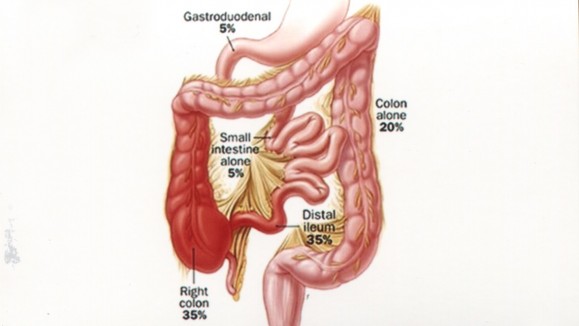Crohn’s: The Facts
Named for the New York-based gastroenterologist doctor who wrote about it in the 1930s (although a Scottish doctor had published a paper about patients with the same symptoms in 1913), Crohn’s disease is a type of inflammatory bowel disease that can
affect any part of the gastrointestinal system. It can start at any age, but usually begins in late teens or early adulthood. Studies have shown that five to 20 percent of affected individuals have a first-
degree relative with an inflammatory bowel disease. “Patients with Crohn’s disease have probably inherited abnormal defense
mechanisms that allow for bacteria to hang out and infiltrate areas it wouldn’t normally get to,” said Dr. Paul Butler, a gastroenterologist at Oro Valley Hospital.
Crohn’s occurs throughout the world, but according to Toronto gastroenterologist Fred Saibil “it is much more prevalent in temperate climates than in tropical ones … [and] is found more often in developed areas such as North America, the United Kingdom, Scandinavia and Western Europe than in developing countries.” It is thought that up to 700,000 people in North America may be affected by Crohn’s. While previously almost unheard of in Asia, it has become more of a problem in Japan.
The primary symptoms of Crohn’s disease are abdominal pain, diarrhoea, vomiting or weight loss, and, in many patients, a clinical examination can easily distinguish a distinct swelling in the lower abdomen. There are a range of diagnostic tools available to physicians, including sigmoidoscopy, colonoscopy, barium enema, enteroscopy, capsule endoscopy, ultrasound, CAT scan, MRI and white blood cell scan. It can often take a variety of these tests to identify the problem area.
There is a similar disease in animals, including cattle, called Johne’s disease, caused by a bacterium belonging to the tuberculosis family. Some British researchers believe this bacterium is being transferred to the human intestine through milk, but there are no definitive results to support this theory. Smoking is also thought to be a risk factor for Crohn’s and it has been shown that giving up cigarettes after surgery reduces the risk of the disease recurring. A new Japanese drug – Entyvio – to treat Crohn’s and ulcerative colitis has just been approved for sale in parts of Europe.


Great site, thank you.
please visit my support page on facebook: #crohnssupporttralee. I’m from Tralee Co. Kerry. Ireland and would appreciate the support. I have Crohn’s disease and an Ileostomy.
Kind regards to all,
Finbarr.
Thank you for all the information about Crohn’s disease. I have a friend who has Crohn’s disease, and I have been really curious about it. That is good to know that the primary symptoms are abdominal pain, diarrhea, vomiting or weight loss, and swelling. I’m glad that they have a variety of different tests to help figure out where the problem area is.
It was really helpful when you mentioned how some symptoms could be abdominal pain and weight loss. Last night I noticed that I’ve lost a lot of weight without even trying, and my stomach was hurting after eating anything, and even simply drinking water. I’ll have to look into finding a doctor to check my symptoms.